PTSD Treatment Options
PTSD treatment options to support your optimal health… naturally.
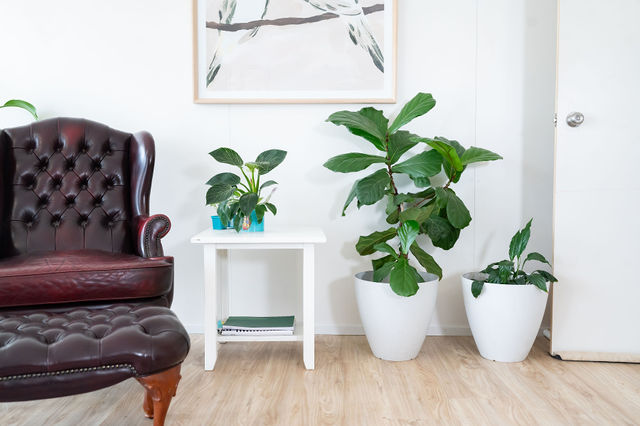
With the world in topsy-turvy, it seemed appropriate to write this post to support the global community, especially those who may be triggered, or retriggered with trauma throughout the COVID-19 lock-downs.
Whilst ~75% of the population will experience a traumatic event throughout their life, ~ 12% of the Australian population will go on to develop PTSD.
Post Traumatic Stress Disorder (PTSD) is a mental health condition that is triggered by experiencing or witnessing a life-threatening event such as:
- Natural Disaster (eg. Tsunami, Bushfires)
- Terrorist Attack (eg. September 11, 2001)
- Public Violence (eg. January 2017 Melbourne Car Attack)
- Being Threatened with Death
- Torture
- Miscarriage
- Birth Trauma
- Still Birth
- Childhood Abuse
- Sexual Abuse
- Domestic Abuse
- Emotional Abuse
- Divorce / Separation
- Death or Loss of a Loved One (eg missing persons)
- Cancer diagnosis
- Motor Vehicle Accident*
- Botched Medical Treatment
- Failure to Recover from a Medical Condition
*Serious accidents are one of the leading causes of PTSD in Australia.
Though PTSD can occur in anyone, there are people who are exposed to trauma as part of their job, and are thus more at risk.
- Defence Force
- Fire Fighters
- Police Officers
- Paramedics
- Emergency Workers
- Social Workers
- Healthcare Workers
Though people who had an adverse childhood experience (ACE), which includes things like violence in the household, substance abuse, socio-economic strains, absence neglectful parents etc. are more likely to suffer with PTSD in later life.
Symptoms of PTSD
- Re-experiencing the event through flash-backs or night-terrors
- Avoidant behaviour (not to recreate the traumatic experience)
- Hypervigilance
- Insomnia
- Low mood / Depression
- Difficulties regulating emotions; Aggression /
- Emotional Outbursts
- Substance Abuse
- A sense of numbness
- Detachment
- Social withdrawal
- Increased “risky” behaviour
PTSD is a complex issue, and whilst it technically can’t be diagnosed until 3 months after a traumatic event (prior to which it would be considered acute stress response), it may not present for decades after the event.
PTSD is not weakness, and the sooner that treatment is sought, the better. Unresolved traumatic stress can lead to changes in the brain. In fact, for this reason, some specialists consider PTSD to be a brain injury, not just a psychological disorder.
The amygdala in our brain, the area responsible for survival responses fight / flight / freeze becomes heightened and can become enlarged.
The hippocampus in our brain, the area responsible for processing events and giving context, can become overwhelmed and even shrink in size – making it very difficult for the person to function optimally, even when they are in a safe environment.
PTSD treatment options
Pharmaceutical interventions are currently considered the preferred first-line therapy by most medical practitioners for other mental health conditions, but for PTSD, psychotherapy is the preferred treatment.
And thanks to research into neuro-plasticity, there is hope for improvement for those who have PTSD.
If you feel very distressed at any time after a traumatic event, talking to your doctor or other health professional is a good first step.
Naturopathic Treatment – PTSD Treatment Options
For those of you seeking Natural Health Support, as a Naturopath, I offer treatment from a holistic perspective and use the “wrap around” care model:
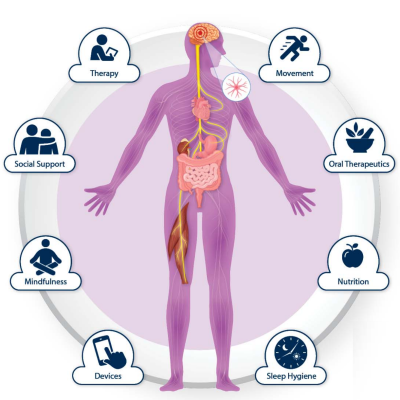
Together, we can look at your support network, your lifestyle, your sleep onset and maintenance, your nutritional status, exercise routine… I may prescribe nutraceuticals and / or herbal extracts to support your sympathetic and parasympathetic nervous system.
We can also look at energetic modalities including flower essences. Below are 5 possible Australian Bush Flowers that I might recommend with your PTSD treatment options:
Fringed Violet
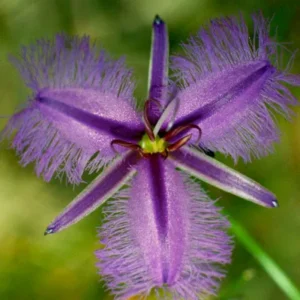 This flower is used for all types of shock; especially in those that have a delayed reaction and when shock is stored in the tissues for weeks or years after the event. This flower is also useful for those who have suffered abuse, for those who are open to being drained by others or allow themselves to take on others problems/worries. This is also used for any damage to the aura that has been caused by anaesthetic, traumas, drugs etc.
This flower is used for all types of shock; especially in those that have a delayed reaction and when shock is stored in the tissues for weeks or years after the event. This flower is also useful for those who have suffered abuse, for those who are open to being drained by others or allow themselves to take on others problems/worries. This is also used for any damage to the aura that has been caused by anaesthetic, traumas, drugs etc.
Fringed Violet flower actions:
• Heals the damage to the aura by realigning body after the shock.
• Removes the effects of recent or old distressing events.
• Prevents one being thrown off balance by external events.
Sundew
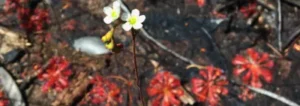
This flower is useful for those that have responded to a shock or traumatic experience by disassociating from the present.
Sundew flower actions:
• Gives one attention to detail and make decisions.
• Helps one be grounded and focused.
• Enables one to be interested in the present.
• Helps one return to the physical.
Sunshine Wattle
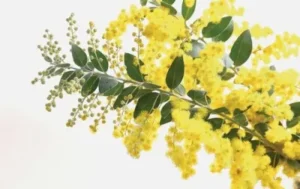 This flower is for who may:
This flower is for who may:
• believe their hard times of the past will continue, and that life is a struggle.
• have an expectation of a grim future.
• have feelings of unworthiness.
Sunshine Wattle flower actions:
• helps one accept the joy and beauty of the present.
• gives one optimism for the future.
• supports one with finding excitement in the present and future
Grey Spider
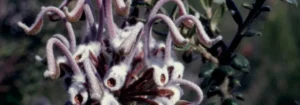 This flower is for use with fear, particularly for extreme terror that comes on suddenly as a reaction to something horrible. This could be a life threatening fear; of death or of losing one’s identity. This flower is also useful when panic has spread throughout a community such as natural disasters and wartime. Also good for nightmares, especially night terrors in children.
This flower is for use with fear, particularly for extreme terror that comes on suddenly as a reaction to something horrible. This could be a life threatening fear; of death or of losing one’s identity. This flower is also useful when panic has spread throughout a community such as natural disasters and wartime. Also good for nightmares, especially night terrors in children.
Grey Spider Flower actions:
• Releases deep fears and terror.
• Gives one faith, calmness and courage.
Sydney Rose
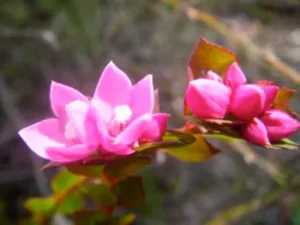 Individually, this flower is for people who feel separated, unloved or deserted
Individually, this flower is for people who feel separated, unloved or deserted
Sydney Rose flower actions:
• Allows one to feel safe and at peace in the realisation that we are all of one love energy.
How we can help
Alongside the above PTSD Treatment Options, we can also use Kinesiology to access your subconscious and find out what your body most needs to support its own self-healing process.
As a Naturopath and Kinesiologist with a special interest in supporting clients in overcoming trauma, I offer support in person or virtually.
Please feel free to contact me if you have any questions, or book in for a consultation when you feel ready to.
I look forward to meeting you.
Yours in Health,
Sarah Claiden

REFERENCES
Beyond Blue – Types of Anxiety, PTSD
Psychology Studio – Phillip Lathopolous, Clinical Psychologist, Psychotherapist and EMDR Practitioner
Metagenics Institute – Overcoming Trauma Using Therapies That Remodel Neurobiology


